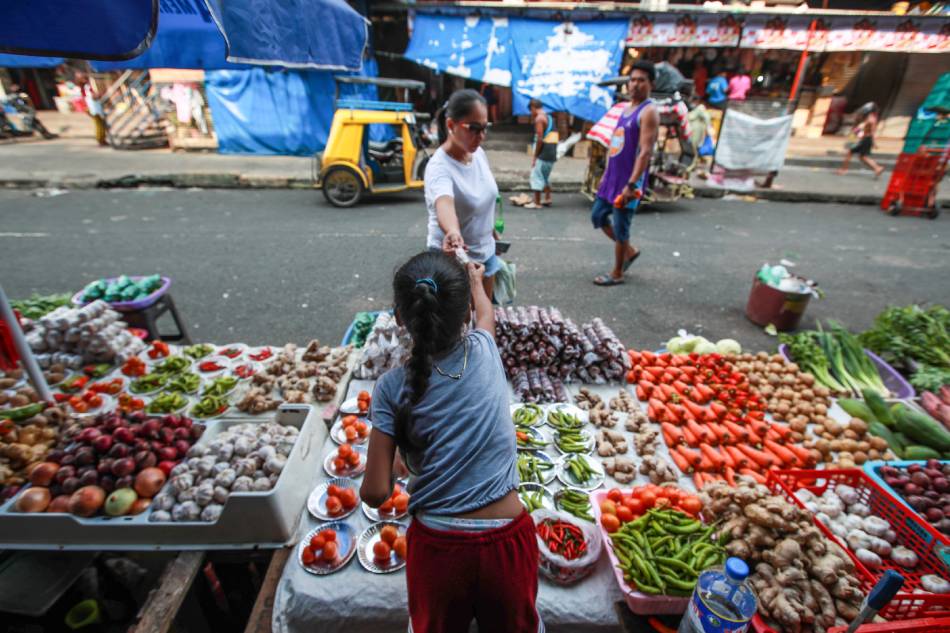Philippine government pledges action on high food prices | ABS-CBN
ADVERTISEMENT

Welcome, Kapamilya! We use cookies to improve your browsing experience. Continuing to use this site means you agree to our use of cookies. Tell me more!
Philippine government pledges action on high food prices
Philippine government pledges action on high food prices
Agence France-Presse
Published Oct 05, 2023 03:04 PM PHT
MANILA — High food prices in the Philippines have pushed inflation to a five-month peak, officials said Thursday, increasing pressure on the government to stop the country's neediest going hungry.
MANILA — High food prices in the Philippines have pushed inflation to a five-month peak, officials said Thursday, increasing pressure on the government to stop the country's neediest going hungry.
Farming subsidies and food stamps for the poor are among government efforts to rein in or mitigate price increases, which have dented the popularity of President Ferdinand Marcos Jr.
Farming subsidies and food stamps for the poor are among government efforts to rein in or mitigate price increases, which have dented the popularity of President Ferdinand Marcos Jr.
"The government is committed to providing targeted assistance to affected vulnerable segments of the population while food prices remain elevated," Economic Planning Secretary Arsenio Balisacan said in a statement announcing last month's consumer prices data.
"The government is committed to providing targeted assistance to affected vulnerable segments of the population while food prices remain elevated," Economic Planning Secretary Arsenio Balisacan said in a statement announcing last month's consumer prices data.
The inflation rate of 6.1 percent was up from 5.3 percent a month earlier.
The inflation rate of 6.1 percent was up from 5.3 percent a month earlier.
ADVERTISEMENT
Last month Marcos put a controversial price cap on rice, a national staple, to support poor households.
Last month Marcos put a controversial price cap on rice, a national staple, to support poor households.
He lifted the price controls on Wednesday, saying the ongoing harvest was easing pressure on supply.
He lifted the price controls on Wednesday, saying the ongoing harvest was easing pressure on supply.
Balisacan cited a food stamps program launched last week, the country's first, that provides P3,000 a month for select "food poor" households, as well as families with pregnant women or nursing mothers.
Balisacan cited a food stamps program launched last week, the country's first, that provides P3,000 a month for select "food poor" households, as well as families with pregnant women or nursing mothers.
He said the government was also giving a P10,000 cash subsidy to 78,000 farmers, a separate P5,000 financial aid to rice farmers and fuel subsidies to more than 74,000 public utility vehicles.
He said the government was also giving a P10,000 cash subsidy to 78,000 farmers, a separate P5,000 financial aid to rice farmers and fuel subsidies to more than 74,000 public utility vehicles.
Rizal Commercial Banking Corp. chief economist Michael Ricafort said increasing inflation was particularly linked to rice prices, crop damage from typhoons earlier this year and a weakening peso that hiked import prices.
Rizal Commercial Banking Corp. chief economist Michael Ricafort said increasing inflation was particularly linked to rice prices, crop damage from typhoons earlier this year and a weakening peso that hiked import prices.
ADVERTISEMENT
Rice is a staple in the country of 110 million people, but the nation cannot produce enough and is one of the world's top importers of the grain.
Rice is a staple in the country of 110 million people, but the nation cannot produce enough and is one of the world's top importers of the grain.
Marcos suffered a 15-point drop, to 65 percent, in his popularity rating in a nationwide poll by the Manila-based independent outfit Pulse Asia last month, compared with June. The survey was made after the president imposed rice price controls.
Marcos suffered a 15-point drop, to 65 percent, in his popularity rating in a nationwide poll by the Manila-based independent outfit Pulse Asia last month, compared with June. The survey was made after the president imposed rice price controls.
A separate poll showed inflation was the top concern among those surveyed.
A separate poll showed inflation was the top concern among those surveyed.
ADVERTISEMENT
ADVERTISEMENT



